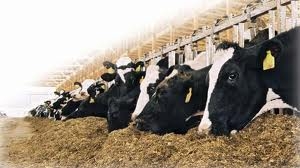Dairy Experts

To help address this issue, AgriSearch, the Agri-Food and Biosciences Institute (AFBI) and the College of Agriculture Food and Rural Enterprise (CAFRE) are planning a series of farm walks this autumn at which the latest local research findings on dry cow feeding will be presented. This information has been obtained from a study being undertaken on 10 Northern Ireland dairy farms involving over 1000 dairy cows. In summary, cows within this research programme have been managed according to one of three strategies during the dry period, as follows:
- Forage only during the dry period
- Forage plus 2 - 4 kg concentrates per day during the dry period,
- Forage plus 2 - 4 kg concentrates per day during the final three weeks of the dry period.
While this experiment is not yet complete, preliminary results suggest concentrate feeding during the dry period had no effect on body condition score change either during the dry period or in early lactation, or on milk yield or milk composition.
Nevertheless, cows with a high body condition score at drying-off lost more body condition during the dry period, and in early lactation, than cows with a low body condition score at drying-off, and as a result produced more milk (30.4 kg per day vs. 28.9 kg per day).
The study has also highlighted that thin cows had a higher risk of being culled during the first 60 days post calving. Thus targeting the nutrition and management of these thin cows during late lactation would appear to be critical in view of the data presented in Figure 1 which highlights that it is difficult to get dry cows to gain body condition.
Although concentrate feeding during the dry period had little effect on subsequent cow performance within this study, concentrates can be very useful carriers for dry cow minerals, and there is considerable evidence that feeding a quality dry cow mineral is a key component of a successful dry cow management programme.
The farm walks will be hosted on three of the farms involved in this study:
Wednesday 31st October: Cathal and Conor Casey, 15 Gruig Lane, Cloughmills, Ballymena, BT44 9JD
Thursday 1st November: Brian & Jonathan Matthews, 15 Lisnasure Road, Donacloney, Craigavon, BT66 7NN
Friday 2nd November: Adrian, Clarence and Aaron Houston, 15 Landahussey Road, Plumbridge, Omagh, BT79 8EQ Each of these events will be signposted from the nearest village, and will start at 11.00 am sharp.
In the interests of biosecurity those attending are asked to wear clean clothing not previously worn while in direct contact with their own animals. Outdoor work boots should not be worn. Protective overalls and footwear will be provided. For further information browse www.agrisearch.org or contact Jason Rankin at AgriSearch on (028) 8778 9770.























